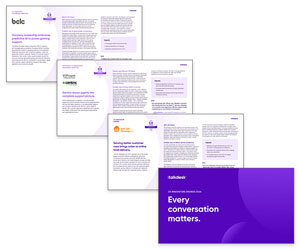Peter Massey of Budd discusses eight key areas on which he believes contact centres really need to focus in order to drive performance.
The Un-Contact Centre
I’m often asked to give views on the future of the contact centre, and being contentious, I say “It shouldn’t exist!” After all, customers and clients don’t want to spend their time emailing, chatting or talking to a contact centre. While digital start-ups start from that position, contact centres don’t.
People in contact centres like fighting fires, whilst new economy businesses prefer smoke detectors, to avoid fires happening.
The analogy is that people in contact centres like fighting fires, whilst new economy businesses prefer smoke detectors, to avoid fires happening.
Of course this is at the heart of the Amazon growth model which we use in “The Best Service Is No Service” – customers don’t want to have to use your service. The marketing messages and product releases should be true. The need to contact a contact centre shouldn’t exist.
So, the un-contact centre is focused on the idea of making customers’ lives easy – so they never have to make contact with you.
Here are eight things to focus on in contact centres to improve performance, each beginning with “un”.
1. Unspoken
The effort of giving feedback is often a big part of the end-to-end experience. Many customers have given up on feedback as they feel they’re wasting their breath, they might as well have not spoken. Businesses not only need to be systematic about hearing them, they need to do two more things:
i. Listen for and understand customer demand without asking.
ii. Feedback on the feedback. “You said we did”, as Tesco used to say.
2. Unheard
People who work in contact centres often feel unheard, despite knowing so much about what customers are saying.
Picking up on what agents know and being systematic about hearing them takes many forms. But showing them you listened, personally and systemically, is key to motivation as well as to making progress. Analytics do not replace this.
3. Uncommon Sense
The ability to do what needs doing, not what the rules say must be done. Many companies enforce processes which do not pass the common sense test.
The ability to do what needs doing, not what the rules say must be done. Many companies enforce processes which do not pass the common sense test.
For example, a car hire company asked me to bring in a fuel receipt on bringing back the car, because the Corsa fuel meter doesn’t read true!
Or Emma at BT told me I must be at home when she runs the internet tests, even though they’re irrelevant to the issue and I’m seldom at home, and if I am, I’m not spending time doing that!
Jumping round that process hurdle was admirably handled in both cases. This is important because an intelligent machine will only do what it’s programmed to do.
The algorithm, the “if this then that” logic, won’t make up for dumb process. So analytics, chatbots, AI and all that is not much use to you unless you understand the business rules you work to – and make them pass the common sense test.
4. Unhuman (or more correctly “Inhuman”)
Following on from the last point, speech analytics, text analytics, robotics, RPA, AI etc. – they feel inhuman, but they can be unrobotic, if you understand and experiment enough to decide the right tone, process and mix for your business.
If you have a great IVR then you’ll know how much work it is to set up and to optimise continually. The new technologies are the same and more.
5. Unseen and Unconnected
Don’t forget what it was like before contact centres, with phones ringing through to people with no systems or knowledge bases. Useless! Yet many businesses still have this spread of expertise all over the place.
The technology now allows you to link them in, but give them the tools and the knowledge. From home or expert support from around the business. keep them in the loop and see them as part of the ecosystem of support.
Get connected to internal colleagues. After all, they are probably the ones who own the root causes of contact and you want them helping you, in fire detection mode, to reduce the contact levels, the fires to be fought.
Get connected to internal colleagues. After all, they are probably the ones who own the root causes of contact and you want them helping you, in fire detection mode, to reduce the contact levels, the fires to be fought.
6. Unstaffed
Do you have a gym and massage at the desk and well-being programmes? Consider scrapping them in favour of a great resource plan, properly resourced.
Stress comes from not having the time to do the job in hand fully and properly. And to do the training and coaching to make a job professional. This is just a JFDI which many businesses don’t get right.
7. Unmanaged
What do your team leaders do? Manage people…. well, most people don’t want to be managed, they want to be helped to do a great job.
Think about the role, the culture, the way you do things and the technical abilities and content of the first-line roles. Would you want to be managed in the way some call centre staff are managed?
8. Unashamed

Peter Massey
The positives of great contact centres are myriad. Go out and celebrate – lots! Contact centres can be great places to work. Is yours?
Well then… highlight the positives, celebrate the successes, catch people doing things well. Be unashamed of working in contact centres.
Thanks to Peter Massey at Budd for sharing this article with us.
For more from Peter, read any of the following articles:
- The New Rules of Customer Service
- 10 Great Conversations to Have With Your Contact Centre Team
- 11 Ideas to Improve Knowledge Management in the Contact Centre
Author: Robyn Coppell
Published On: 1st May 2019 - Last modified: 27th Nov 2023
Read more about - Call Centre Management, CX, Employee Engagement, Handling Customers, Performance Management, Peter Massey, Team Management









































